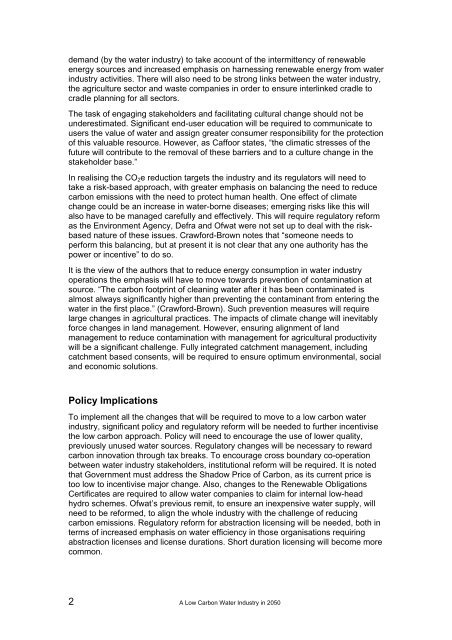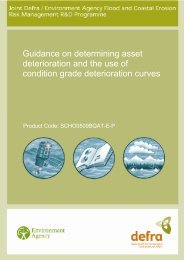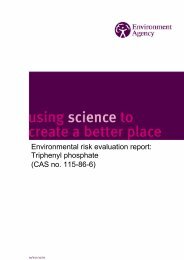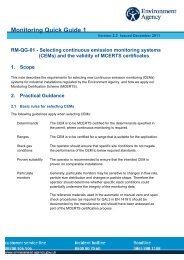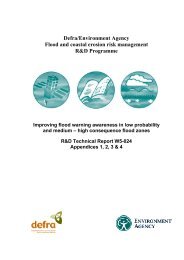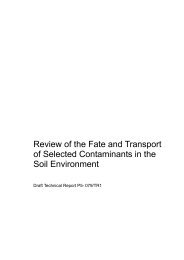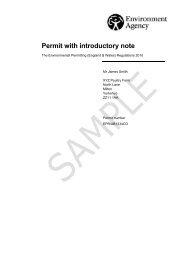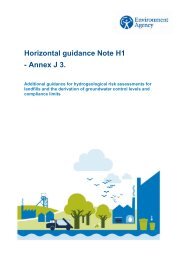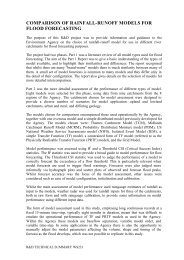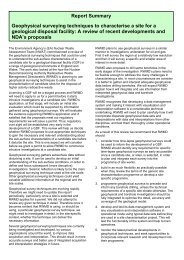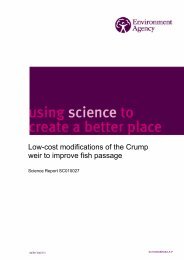A Low Carbon Water Industry in 2050 - Environment Agency
A Low Carbon Water Industry in 2050 - Environment Agency
A Low Carbon Water Industry in 2050 - Environment Agency
You also want an ePaper? Increase the reach of your titles
YUMPU automatically turns print PDFs into web optimized ePapers that Google loves.
demand (by the water <strong>in</strong>dustry) to take account of the <strong>in</strong>termittency of renewable<br />
energy sources and <strong>in</strong>creased emphasis on harness<strong>in</strong>g renewable energy from water<br />
<strong>in</strong>dustry activities. There will also need to be strong l<strong>in</strong>ks between the water <strong>in</strong>dustry,<br />
the agriculture sector and waste companies <strong>in</strong> order to ensure <strong>in</strong>terl<strong>in</strong>ked cradle to<br />
cradle plann<strong>in</strong>g for all sectors.<br />
The task of engag<strong>in</strong>g stakeholders and facilitat<strong>in</strong>g cultural change should not be<br />
underestimated. Significant end-user education will be required to communicate to<br />
users the value of water and assign greater consumer responsibility for the protection<br />
of this valuable resource. However, as Caffoor states, “the climatic stresses of the<br />
future will contribute to the removal of these barriers and to a culture change <strong>in</strong> the<br />
stakeholder base.”<br />
In realis<strong>in</strong>g the CO 2 e reduction targets the <strong>in</strong>dustry and its regulators will need to<br />
take a risk-based approach, with greater emphasis on balanc<strong>in</strong>g the need to reduce<br />
carbon emissions with the need to protect human health. One effect of climate<br />
change could be an <strong>in</strong>crease <strong>in</strong> water-borne diseases; emerg<strong>in</strong>g risks like this will<br />
also have to be managed carefully and effectively. This will require regulatory reform<br />
as the <strong>Environment</strong> <strong>Agency</strong>, Defra and Ofwat were not set up to deal with the riskbased<br />
nature of these issues. Crawford-Brown notes that “someone needs to<br />
perform this balanc<strong>in</strong>g, but at present it is not clear that any one authority has the<br />
power or <strong>in</strong>centive” to do so.<br />
It is the view of the authors that to reduce energy consumption <strong>in</strong> water <strong>in</strong>dustry<br />
operations the emphasis will have to move towards prevention of contam<strong>in</strong>ation at<br />
source. “The carbon footpr<strong>in</strong>t of clean<strong>in</strong>g water after it has been contam<strong>in</strong>ated is<br />
almost always significantly higher than prevent<strong>in</strong>g the contam<strong>in</strong>ant from enter<strong>in</strong>g the<br />
water <strong>in</strong> the first place.” (Crawford-Brown). Such prevention measures will require<br />
large changes <strong>in</strong> agricultural practices. The impacts of climate change will <strong>in</strong>evitably<br />
force changes <strong>in</strong> land management. However, ensur<strong>in</strong>g alignment of land<br />
management to reduce contam<strong>in</strong>ation with management for agricultural productivity<br />
will be a significant challenge. Fully <strong>in</strong>tegrated catchment management, <strong>in</strong>clud<strong>in</strong>g<br />
catchment based consents, will be required to ensure optimum environmental, social<br />
and economic solutions.<br />
Policy Implications<br />
To implement all the changes that will be required to move to a low carbon water<br />
<strong>in</strong>dustry, significant policy and regulatory reform will be needed to further <strong>in</strong>centivise<br />
the low carbon approach. Policy will need to encourage the use of lower quality,<br />
previously unused water sources. Regulatory changes will be necessary to reward<br />
carbon <strong>in</strong>novation through tax breaks. To encourage cross boundary co-operation<br />
between water <strong>in</strong>dustry stakeholders, <strong>in</strong>stitutional reform will be required. It is noted<br />
that Government must address the Shadow Price of <strong>Carbon</strong>, as its current price is<br />
too low to <strong>in</strong>centivise major change. Also, changes to the Renewable Obligations<br />
Certificates are required to allow water companies to claim for <strong>in</strong>ternal low-head<br />
hydro schemes. Ofwat’s previous remit, to ensure an <strong>in</strong>expensive water supply, will<br />
need to be reformed, to align the whole <strong>in</strong>dustry with the challenge of reduc<strong>in</strong>g<br />
carbon emissions. Regulatory reform for abstraction licens<strong>in</strong>g will be needed, both <strong>in</strong><br />
terms of <strong>in</strong>creased emphasis on water efficiency <strong>in</strong> those organisations requir<strong>in</strong>g<br />
abstraction licenses and license durations. Short duration licens<strong>in</strong>g will become more<br />
common.<br />
2 A <strong>Low</strong> <strong>Carbon</strong> <strong>Water</strong> <strong>Industry</strong> <strong>in</strong> <strong>2050</strong>


